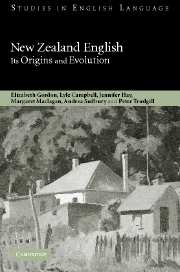Book contents
- Frontmatter
- Contents
- List of figures
- List of tables
- Acknowledgements
- List of abbreviations
- Symbols used
- 1 Introduction
- 2 Overview and background
- 3 The historical background
- 4 Previous attempts to explain the origins of New Zealand English
- 5 Methodology
- 6 The variables of early New Zealand English
- 7 The origins of New Zealand English: reflections from the ONZE data
- 8 Implications for language change
- Appendix 1 Mobile Unit speakers
- Appendix 2 The historical background of some settlements visited by the Mobile Unit
- Appendix 3 Maps
- Appendix 4 Seven Mobile Unit speakers born outside New Zealand
- Appendix 5 Acoustic vowel charts for the ten speakers included in the acoustic analysis
- Appendix 6 Speaker indexes for quantified variables, together with relevant social information
- References
- Index
5 - Methodology
Published online by Cambridge University Press: 22 September 2009
- Frontmatter
- Contents
- List of figures
- List of tables
- Acknowledgements
- List of abbreviations
- Symbols used
- 1 Introduction
- 2 Overview and background
- 3 The historical background
- 4 Previous attempts to explain the origins of New Zealand English
- 5 Methodology
- 6 The variables of early New Zealand English
- 7 The origins of New Zealand English: reflections from the ONZE data
- 8 Implications for language change
- Appendix 1 Mobile Unit speakers
- Appendix 2 The historical background of some settlements visited by the Mobile Unit
- Appendix 3 Maps
- Appendix 4 Seven Mobile Unit speakers born outside New Zealand
- Appendix 5 Acoustic vowel charts for the ten speakers included in the acoustic analysis
- Appendix 6 Speaker indexes for quantified variables, together with relevant social information
- References
- Index
Summary
The most difficult step in the study of language is the first step.
(Bloomfield 1933: 21)Introduction
ONZE has been (and is) an evolving project. The methodology was not completely defined when the project began, and the techniques we have used have been refined constantly throughout the course of our research. Although we knew the types of analysis we intended to carry out, some of the details only became clear after we had started. For example, at the start of the auditory perceptual analysis, only phonological features that seemed significant at the time were noted. Later we realised that we were undoubtedly missing features that may turn out to be important, and so the template described in Section 3.1 below was created in order to provide structure for this part of the analysis. At other times, the research led us down blind alleys. We were sure that the type of settlement in which the speakers lived was significant but it was a considerable time before we found the exact division that proved to be relevant. Before we realised that the significant factor was the make-up of the towns, with predominantly Scottish towns and mixed towns being significantly different, we had investigated towns that were predominantly rural or goldmining or military, only to find that this distinction was not as significant as first imagined.
- Type
- Chapter
- Information
- New Zealand EnglishIts Origins and Evolution, pp. 85 - 99Publisher: Cambridge University PressPrint publication year: 2004



